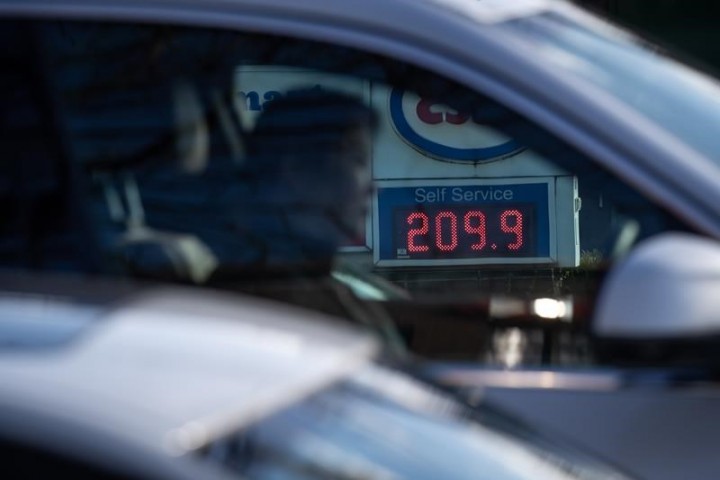Republicans are doing their best to resurrect the controversy around the long-dead Keystone XL pipeline expansion, using it as an election-year political cudgel against Joe Biden in hopes of convincing voters that soaring gasoline prices are the U.S. president’s fault.
Members of the House Committee on Energy and Commerce took turns Wednesday grilling a group of senior oil and gas industry leaders summoned to testify before the committee about the apparent disconnect between crude oil prices and the cost at the pump.
The lines of questioning depended on political affiliation: Democrats excoriated the executives for doing little to help, banking billions in profits without boosting production, while Republicans looked for ways to pin the blame on the White House.
Keystone XL — the cross-border project Biden killed on his first day in office — proved a popular talking point.
“What happened is we denied Canada access to our market,” said H.R. McMaster, one of Donald Trump’s former national security advisers and the only one of Wednesday’s panel of witnesses who wasn’t an oil and gas executive.
“What’s Canada going to do? They’re going to have to sell oil elsewhere — maybe to China, for example, which will give China maybe more power over Canada’s economy.”
Rep. David McKinley, who has represented his West Virginia district for the Republicans since 2011, brandished a Wall Street Journal report from Tuesday citing anonymous sources who say the U.S. is actively seeking to boost energy imports from Canada.
“Really? Didn’t he just cancel the permit for the Keystone pipeline that would have imported 830,000 barrels of crude oil per day from Canada?” McKinley asked.
“Canada’s network of pipelines are already running at full capacity, so we’ll have to import by rail, which according to analysts is more expensive.”
Biden administration officials did not immediately respond Wednesday to questions about Canadian energy imports, which the White House is said to be anxious to increase to ease supply pressures that are largely the result of a North American ban on Russian energy.
The White House has, however, shrugged off the notion that a different outcome on Keystone XL would have had any impact on the current price of gas — a message repeated Wednesday by Virginia Democrat Rep. Donald McEachin.
“The reality is that the Keystone pipeline would not be operational until at least next year, so the notion that somehow that’s adversely affecting the price of oil and the price of gas at the pump is to me somewhat mystifying,” McEachin said.
“What’s more, the Keystone XL was essentially a Canadian export pipeline designed to take Canadian oil to foreign markets, and Canadian officials have said as much.”
Neither point, however, has discouraged Republicans from using the project against Biden, especially with Canada and the U.S. both blocking imports of Russian oil, gas and coal as part of a broad and expanding suite of punishing economic sanctions in response to Vladimir Putin’s invasion of Ukraine.
Last week, Biden announced plans for the single largest release of oil from the country’s extensive strategic reserves — up to a million barrels a day for the next six months — amid Democratic fears that the price of gas is going to cost them dearly in November’s midterm elections.
White House press secretary Jen Psaki said Wednesday the administration is doing all it can to soften the blow for U.S. consumers, noting that in addition to U.S. plans, the International Energy Agency’s 31 member countries plan to release an additional 60 million barrels.
“What we’re trying to do is mitigate those impacts,” Psaki said. “All of these (steps) are part of our collective effort to mitigate the impacts on the American people.”
The Canadian Embassy in Washington responded to inquiries with a statement confirming only that Canada is hard at work with “international partners in Europe and around the world” to end the dependence of other countries on Russian energy.
Longer term, the goal is “deepening our co-operation on energy security toward a net-zero energy transition,” the statement said. Natural Resources Minister Jonathan Wilkinson has already said Canada would be able to increase output by as much as 300,000 barrels a day in 2022.
Meanwhile, stakeholders are waiting for more clarity on the fate of another cross-border pipeline with an uncertain future — Enbridge Inc.’s Line 5, which Michigan Gov. Gretchen Whitmer is trying to shut down for fear of an ecological disaster where the twin line crosses beneath the Great Lakes.
Enbridge has a motion before a federal judge in Grand Rapids, Mich., for a summary judgment in the ongoing legal dispute that would formally prevent the state from unilaterally shutting down what proponents say is a vital energy artery for both Canada and the U.S.
The federal government in Ottawa, the Canadian Chamber of Commerce and a variety of U.S. business institutions have filed briefs with the court supporting Enbridge’s argument, while various Indigenous and environmental groups have urged Neff to reject it.
With filings in that case now largely complete, the next significant development is expected to be a decision on Enbridge’s motion, which observers say is likely still a number of months away.
This report by The Canadian Press was first published April 6, 2022.
James McCarten, The Canadian Press
Related




























